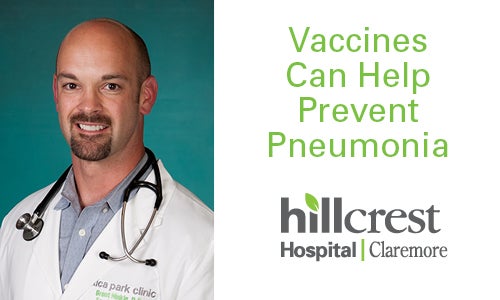
Each year about 1 million people in the United States seek hospital care for pneumonia, according to the Centers for Disease Control and Prevention.
Pneumonia can range in seriousness from mild to life threatening. It is most serious for infants and young children, people older than age 65, and people with health problems or weakened immune systems.
“Children and seniors have the highest risk of developing pneumonia,” says family physician Brent Hinkle, D.O., of Utica Park Clinic in Claremore. “Children with healthy immune systems generally respond well to treatment. If diagnosed and treated properly, they have favorable outcomes in most cases. For seniors, other health issues can make treating pneumonia more complicated and problematic. The incidence of comorbid conditions such as heart disease, diabetes and lung disease obviously rises in the elderly. When factoring in those and possible other various disease states, the treatment, complication rate and recovery times can be more extensive in senior patients.”
Annually, about 50,000 people die from the disease in the United States. Most of those affected in the United States are adults. Vaccines and appropriate treatment could prevent many of these deaths.
Vaccines can help prevent infection by some of the bacteria and viruses that can cause pneumonia. These include the flu vaccine as well as pneumococcal vaccines, among others.
Dr. Hinkle recommends discussing your immunizations with your primary care provider and determining whether a pneumonia vaccination is appropriate.
Types and Treatment
Pneumonia can be separated into two categories says Dr. Hinkle. “Hospital-acquired pneumonia develops during a hospital stay and can be potentially serious and difficult to treat, often requiring potent antibiotics. Community-acquired pneumonia can be broken down into bacterial, viral and fungal types of pneumonias, with bacterial pneumonias being the most common of the three. Bacterial infections are commonly transmitted when someone infected coughs or sneezes into the air.”
Walking pneumonia is a less severe form of bacterial pneumonia that generally feels like a bad cold and responds well to antibiotics. Viral pneumonia is the second most common with symptoms similar to the flu. Antibiotics do not help in treating viral infections, so they require supportive measures including increased fluids, rest and occasionally breathing medications. Fungal pneumonias are less common and typically infect those with weakened immune systems or people with occupations that have high exposure to fungal elements in the air.
Reduce Your Risk
“There are two vaccinations available to help prevent the development of pneumonia,” Dr. Hinkle says. “Prevnar 13 is a vaccine that is available for people 65 years of age or older, children under the age of 5 years and those at high risk of developing bacterial pneumonia. The other vaccine is Pneumovax 23 for patients who are 65 years old or older, children older than 2 years old at high risk of developing bacterial pneumonia and people between the ages of 19-64 who have an extensive smoking history or have chronic lung disease.”
He notes that a large portion of the senior population thinks that since they have received one pneumonia vaccination at the age of 65, they do not need a second vaccination. However, there are two vaccinations available to help maximize their immunity against the development of pneumonia.
In addition to ensuring appropriate vaccinations, lifestyle modifications and good habits can also help to prevent both bacterial and viral pneumonia. Those include, but are not limited to, smoking cessation, hand washing, exercise, good balanced diet, restful sleep and avoidance of sick contacts.
How It Spreads
The viruses and bacteria that lead to pneumonia can be contagious. The bacteria are spread by coughs, sneezes, person-to-person contact and handling contaminated objects. “If diagnosed with pneumonia, it is especially important to be diligent about covering your nose and mouth when coughing or sneezing which sends germs into the air,” says Dr. Hinkle. “This is particularly important when in public or around those who may have a weaker immune system, such as children or the elderly.”
For help with pneumonia prevention or treatment, please call 918-342-3633 to make an appointment with Dr. Hinkle at his office on the campus of Hillcrest Hospital Claremore.
